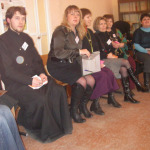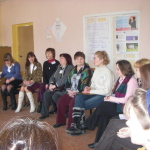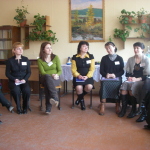Seminars for psychology teachers, social pedagogues and church diakonia workers were held in March and June 2009 in Kaliningrad and Chernyakhovsk near Kaliningrad to train them for work with the Ladya prevention program.
The seminars were organized by the Kaliningrad Regional Ministry of Education in cooperation with the Russian Orthodox diocese of Kaliningrad. The training was conducted by specialists from Blago, a regional public organization in Bryansk, and Diakonia, a church charity in St. Petersburg. Over 50 teachers and psychologists from the city of Kaliningrad and its region were trained for work with the program.
Ladya is a program for the primary prevention of HIV/AIDS and risk behaviours among teenagers. It was created by a team of church related and secular specialists including teachers, psychologists, psychiatrists and narcologists.
The Ladya program is special in that unlike information and education programs so popular today it addresses the fundamental causes of risk behaviours among teenagers leading to HIV infection as well as other socially dangerous diseases, the use of drugs, etc. It is based on the principles of non-specific prevention aimed to cultivate in teenagers such spiritual and moral guidelines which, once realized in the behaviour of the program participants, can lessen the risk of infection and hence reduce the spreading of HIV infection to minimum. The program helps to actualize goodness in children, to build their ability to resist evil and to develop their spiritual and moral potential. The program consists of 23 lessons: Happiness, I and My Life, Man and Woman, Good and Evil, Overcoming Problems, etc. Several lessons are focused on the prevention of HIV infection and drug addiction. A lesson lasts an hour and a half. Each class uses various activities including a discussion on a teenager’s experience, reflection, role games and reception of new information.
Along with teenagers, their parents and educational administrators are involved in the work, thus ensuring greater efficiency of the program’s pedagogical impact. The Ladya program is intended for teaching in ordinary, boarding and vocational schools as additional education for both specially adapted and the so-called problem teenagers.
The Ladya program does not have catechization as its aim, nor is it intended for inchurched children alone but rather for an ordinary school audience. It can also be used in a Sunday school. It can be easily adapted for use in an environment where Christianity is not a dominant religion since Russian religious traditions uphold the same basic ethical guidelines.
In July 2009, the program was presented to a meeting of the expert consultative council at the Kaliningrad Regional Ministry of Education. The council consists of representatives of the Regional Duma, the higher education institutions, the regional education monitoring service, the department of legal and social protection of childhood, the medical prevention center, the narcology hospital, the department for interdepartmental prevention cooperation of the Federal Drug Control Service for the Kaliningrad Region and the diocese of Kaliningrad. It was agreed to recommend the HIV/AIDS and risk behaviours primary prevention program subject to obligatory selection and training of special program teachers and parents’ consent. The program was also to take into account the age of students in teaching them outside regular hours and to observe proper presentation of information in classes devoted to the prevention of dependent behaviours and socially dangerous diseases.
In 2008-2009 the training for work with the Ladya program was undertaken in cities of Bryansk, Ivanovo, Surgut, St. Petersburg and Orenburg.


